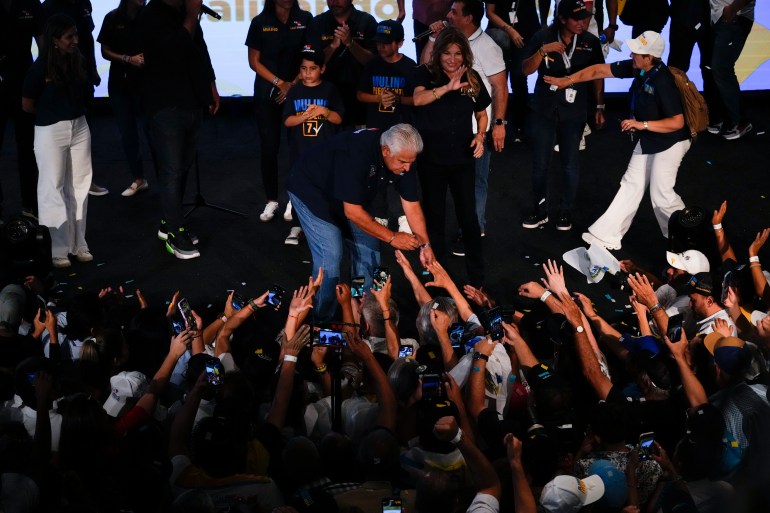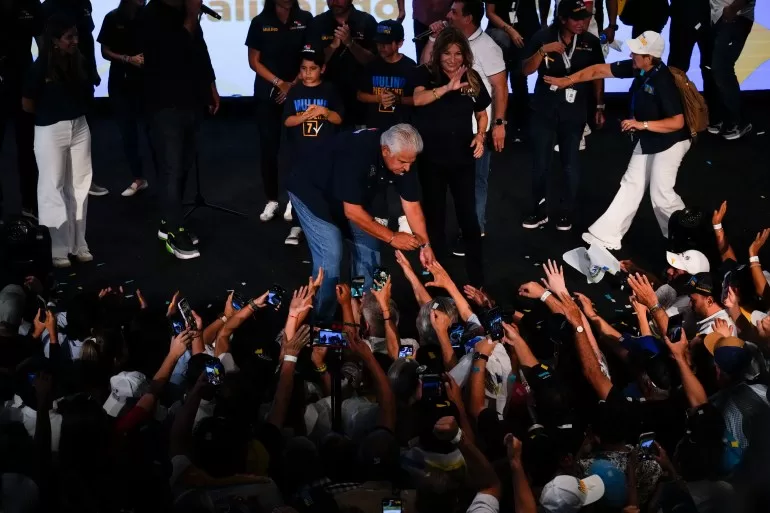The stand-in candidate for popular ex-President Ricardo Martinelli has promised to boost the economy.
Authorities unofficially called the race late on Sunday after three of Mulino’s closest competitors conceded defeat. The former security minister, who was a late entrant to the race after his mentor President Ricardo Martinelli was removed from power after being convicted of corruption, secured more than a third of the votes cast in the country of 4.4 million people.
At stake for the new leader is the Central American country’s woes with government corruption, a severe drought that has affected maritime traffic in the economically important Panama Canal, as well as US-bound migrants passing through Panama’s jungles in droves.
“Mission accomplished,” Mulino said after the early results were released. “This is perhaps the most important date of my life, and the greatest responsibility of a Panamanian falls on my shoulders and my family to lead the destiny of the nation.”
Running on the ticket of the Achieving Goals and Alliance parties, the 64-year-old had led opinion polls ahead of the vote as he played up his connections to Martinelli, who was initially his running mate.
The popular ex-president, who oversaw a booming economy from 2009 to 2014, was set to run with Mulino as his deputy. However, he was barred due to a money laundering conviction.
The firebrand politician still dominated much of the race, campaigning for Mulino from inside the Nicaraguan embassy, in which he took refuge on February 8 after receiving political asylum.
Mulino acknowledged Martinelli after his win, saying: “When you invited me to be vice president, I never imagined this.”
More than 77 percent of three million eligible voters cast their ballots for a new president, parliament and local governments for the next five years.
Anticorruption candidate Ricardo Lombana trailed Mulino in second place, ahead of former President Martin Torrijos and former chancellor Romulo Roux. The three conceded defeat on Sunday evening.

Power behind the throne
Mulino, who will serve as head of state and prime minister, for a single five-year term, is set to take office on July 1.
A last-minute Supreme Court decision had validated his bid to stand in for Martinelli after the former president lost an appeal against his conviction.
Mulino’s candidacy had been challenged because he had not won a primary vote or picked a running partner as required under Panama laws.
But the court dismissed that complaint in a ruling welcomed by Martinelli, whose government oversaw an infrastructure boom, including a widening of the Panama Canal and construction of Central America’s first metro line.
Mulino has promised a return to strong economic growth. Many believe ex-president Martinelli will lead the country from behind the scenes.
Voters were highly concerned about corruption and the economy. The term of outgoing President Laurentino Cortizo of the majority Democratic Revolutionary Party (PRD) was marred by allegations of widespread official corruption, declining foreign investment and high public debt.
Last year, the country was roiled by protests, targeting a government concession for Canadian miner First Quantum to continue operating the Cobre Panama copper mine.
Critics say that the mine endangers water sources; a particularly sensitive issue in Panama currently. Drought has effectively handicapped trade transit through the Panama Canal.
The country also faces high income inequality, with unemployment close to 10 percent, and gross domestic product (GDP) growth is forecast to slow from 7.3 percent in 2023 to 2.5 percent this year, according to the International Monetary Fund.
Mulino will also have to tackle migration issues. Some half a million migrants have streamed through the Darien Gap between Colombia and Panama. Activists warn that they face the threat of exploitation and physical danger.
